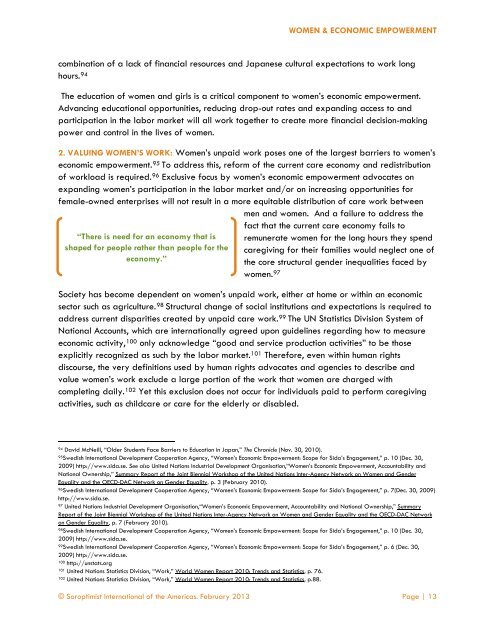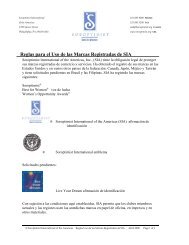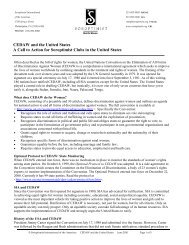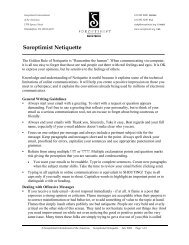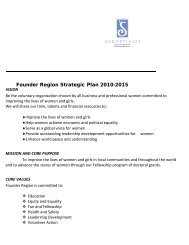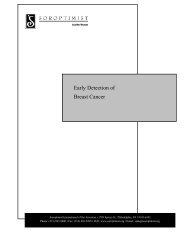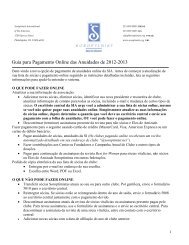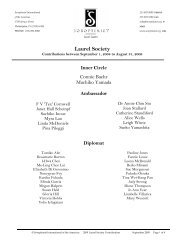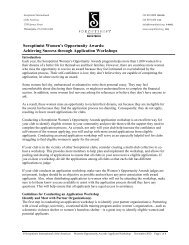Women and Economic Empowerment White Paper - Soroptimist
Women and Economic Empowerment White Paper - Soroptimist
Women and Economic Empowerment White Paper - Soroptimist
Create successful ePaper yourself
Turn your PDF publications into a flip-book with our unique Google optimized e-Paper software.
WOMEN & ECONOMIC EMPOWERMENT<br />
combination of a lack of financial resources <strong>and</strong> Japanese cultural expectations to work long<br />
hours. 94<br />
The education of women <strong>and</strong> girls is a critical component to women’s economic empowerment.<br />
Advancing educational opportunities, reducing drop-out rates <strong>and</strong> exp<strong>and</strong>ing access to <strong>and</strong><br />
participation in the labor market will all work together to create more financial decision-making<br />
power <strong>and</strong> control in the lives of women.<br />
2. VALUING WOMEN’S WORK: <strong>Women</strong>’s unpaid work poses one of the largest barriers to women’s<br />
economic empowerment. 95 To address this, reform of the current care economy <strong>and</strong> redistribution<br />
of workload is required. 96 Exclusive focus by women’s economic empowerment advocates on<br />
exp<strong>and</strong>ing women’s participation in the labor market <strong>and</strong>/or on increasing opportunities for<br />
female-owned enterprises will not result in a more equitable distribution of care work between<br />
men <strong>and</strong> women. And a failure to address the<br />
“There is need for an economy that is<br />
shaped for people rather than people for the<br />
economy.”<br />
fact that the current care economy fails to<br />
remunerate women for the long hours they spend<br />
caregiving for their families would neglect one of<br />
the core structural gender inequalities faced by<br />
women. 97<br />
Society has become dependent on women’s unpaid work, either at home or within an economic<br />
sector such as agriculture. 98 Structural change of social institutions <strong>and</strong> expectations is required to<br />
address current disparities created by unpaid care work. 99 The UN Statistics Division System of<br />
National Accounts, which are internationally agreed upon guidelines regarding how to measure<br />
economic activity, 100 only acknowledge “good <strong>and</strong> service production activities” to be those<br />
explicitly recognized as such by the labor market. 101 Therefore, even within human rights<br />
discourse, the very definitions used by human rights advocates <strong>and</strong> agencies to describe <strong>and</strong><br />
value women’s work exclude a large portion of the work that women are charged with<br />
completing daily. 102 Yet this exclusion does not occur for individuals paid to perform caregiving<br />
activities, such as childcare or care for the elderly or disabled.<br />
94<br />
David McNeill, “Older Students Face Barriers to Education in Japan,” The Chronicle (Nov. 30, 2010).<br />
95<br />
Swedish International Development Cooperation Agency, “<strong>Women</strong>’s <strong>Economic</strong> <strong>Empowerment</strong>: Scope for Sida’s Engagement,” p. 10 (Dec. 30,<br />
2009) http://www.sida.se. See also United Nations Industrial Development Organisation,“<strong>Women</strong>’s <strong>Economic</strong> <strong>Empowerment</strong>, Accountability <strong>and</strong><br />
National Ownership,” Summary Report of the Joint Biennial Workshop of the United Nations Inter-Agency Network on <strong>Women</strong> <strong>and</strong> Gender<br />
Equality <strong>and</strong> the OECD-DAC Network on Gender Equality, p. 3 (February 2010).<br />
96<br />
Swedish International Development Cooperation Agency, “<strong>Women</strong>’s <strong>Economic</strong> <strong>Empowerment</strong>: Scope for Sida’s Engagement,” p. 7(Dec. 30, 2009)<br />
http://www.sida.se.<br />
97<br />
United Nations Industrial Development Organisation,“<strong>Women</strong>’s <strong>Economic</strong> <strong>Empowerment</strong>, Accountability <strong>and</strong> National Ownership,” Summary<br />
Report of the Joint Biennial Workshop of the United Nations Inter-Agency Network on <strong>Women</strong> <strong>and</strong> Gender Equality <strong>and</strong> the OECD-DAC Network<br />
on Gender Equality, p. 7 (February 2010).<br />
98<br />
Swedish International Development Cooperation Agency, “<strong>Women</strong>’s <strong>Economic</strong> <strong>Empowerment</strong>: Scope for Sida’s Engagement,” p. 10 (Dec. 30,<br />
2009) http://www.sida.se.<br />
99<br />
Swedish International Development Cooperation Agency, “<strong>Women</strong>’s <strong>Economic</strong> <strong>Empowerment</strong>: Scope for Sida’s Engagement,” p. 6 (Dec. 30,<br />
2009) http://www.sida.se.<br />
100<br />
http://unstats.org<br />
101<br />
United Nations Statistics Division, “Work,” World <strong>Women</strong> Report 2010: Trends <strong>and</strong> Statistics, p. 76.<br />
102<br />
United Nations Statistics Division, “Work,” World <strong>Women</strong> Report 2010: Trends <strong>and</strong> Statistics, p.88.<br />
© <strong>Soroptimist</strong> International of the Americas. February 2013 Page | 13


